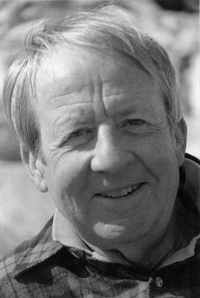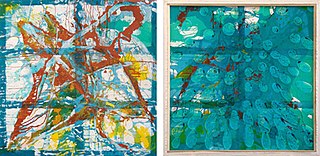Related Research Articles
John Walker is an English painter and printmaker. He has been called "one of the standout abstract painters of the last 50 years."
Susanna J. Coffey is an American artist and educator. She is the F. H. Sellers Professor in Painting at the School of the Art Institute of Chicago and lives and works in New York City. She was elected a member the National Academy of Design in 1999.
Michelle Stuart is an American multidisciplinary artist known for her sculpture, painting and environmental art. She is based in New York City.
Joan Snyder is an American painter from New York. She is a MacArthur Fellow, a Guggenheim Fellow, and a National Endowment for the Arts Fellow (1974).

Ray K. Metzker was an American photographer known chiefly for his bold, experimental B&W cityscapes and for his large "composites", assemblages of printed film strips and single frames. His work is held in various major public collections and is the subject of eight monographs. He received awards from the John Simon Guggenheim Memorial Foundation, National Endowment for the Arts and Royal Photographic Society.
The Bruce High Quality Foundation is an arts collective in Brooklyn, New York City, the United States, which was "created to foster an alternative to everything." The collective is made up of five to eight rotating and anonymous members, most or all of whom are Cooper Union graduates. The group has attracted attention with the subversive, humorous and erudite style of their work and operates an unaccredited art school, the Bruce High Quality Foundation University.
María Elena González is a Cuban-American artist best known for her sculptural installations. In 1999, González received widespread acclaim for her site-specific outdoor sculpture, Magic Carpet/Home. Commissioned by the Public Art Fund, it was originally installed in Brooklyn, New York, and subsequently in Pittsburgh, Pennsylvania and Los Angeles, California. In the summer of 2005, González was a resident faculty member at the Skowhegan School of Painting and Sculpture. In 2005 and 2008, she was also a Visiting Artist faculty member at the Cooper Union School of Art. She currently teaches at the San Francisco Art Institute.
Jack Albert Youngerman was an American artist known for his constructions and paintings.
Bonnie Collura is an American artist. Most of her work is considered as abstract biomorphic sculptures and drawings that are rooted in figuration. Systems of connected characters are drawn together from mainstream popular culture, mythology, and folklore.
Sharon Hayes is an American multimedia artist. She came to prominence as an artist and an activist during the East Village scene in the early '90s. She primarily works with video, installation, and performance as her medium. Using multimedia, she "appropriates, rearranges, and remixes in order to revitalize spirits of dissent". Hayes's work addresses themes such as romantic love, activism, queer theory, and politics. She incorporates texts from found speeches, recordings, songs, letters, and her own writing into her practice that she describes as “a series of performatives rather than performance.”

Danh Võ is a contemporary artist of Vietnamese descent. He lives and works in Berlin and Mexico City.
Allan deSouza is a photographer and multi-media artist. He currently works in San Francisco, where he is the Chair of the Department of Art Practice at the University of California, Berkeley.

Arlene Shechet is an American artist. She lives and works in New York City, Woodstock, and Kingston, New York.

Dona Nelson is an American painter, best known for immersive, gestural, primarily abstract works employing unorthodox materials, processes and formats to disrupt conventional notions of painting and viewership. A 2014 New Yorker review observed, "Nelson gives notice that she will do anything, short of burning down her house to bully painting into freshly spluttering eloquence." Since 2002, long before it became a more common practice, Nelson has produced free-standing, double-sided paintings that create a more complex, conscious viewing experience. According to New York Times critic Roberta Smith, Nelson has dodged the burden of a "superficially consistent style," sustained by "an adventuresome emphasis on materials" and an athletic approach to process that builds on the work of Jackson Pollock. Writers in Art in America and Artforum credit her experimentation with influencing a younger generation of painters exploring unconventional techniques with renewed interest. Discussing one of Nelson's visceral, process-driven works, curator Klaus Kertess wrote, the paint-soaked "muslin is at once the tool, the medium, and the made."

Gary Stephan is an American abstract painter born in Brooklyn who has exhibited his work throughout the United States and Europe.
Sara Cwynar is a contemporary artist who works with photography, collage, installation and book-making. Cwynar was born in Vancouver, Canada in 1985 and currently lives and works in Brooklyn, New York. Cwynar's work presents a marriage of old and new forms that are intended to challenge the way that people encounter visual and material culture in everyday life.
Hannah Black is a visual artist, critic, and writer. Her work spans video, text and performance and draws on communism, feminist, and Afro-pessimist theory, autobiographical fragments and pop music. She is best known for her open letter criticizing the curators of the 2017 Whitney Biennial for exhibiting Dana Schultz's painting Open Casket.

Carol Haerer (1933-2002) was an American artist known for abstract painting in the vein of Minimalism and Lyrical abstraction.
The Sackler family is an American family, many of whom are known for founding and owning the pharmaceutical company Purdue Pharma. Purdue Pharma, and by extension some members of the family, have faced criticism and lawsuits regarding overprescription of addictive pharmaceutical drugs, including Oxycontin, and Purdue Pharma's role in the North American opioid crisis. According to the New Yorker, Purdue Pharma played a "special role" in the opioid crisis because the company "was the first to set out, in the nineteen-nineties, to persuade the American medical establishment that strong opioids should be much more widely prescribed—and that physicians’ longstanding fears about the addictive nature of such drugs were overblown."
References
- ↑ Storr, Robert. "Catalogue Essay: Robert Storr on Elena Sisto". Two Coats of Paint. Retrieved 6 December 2016.CS1 maint: discouraged parameter (link)
- ↑ "All Fellows: Elena Sisto". John Simon Guggenheim Memorial Foundation. Retrieved 6 December 2016.CS1 maint: discouraged parameter (link)
- ↑ "Elena Sisto - Artists - Lori Bookstein Fine Art". John Simon Guggenheim Memorial Foundation. Retrieved 25 January 2017.CS1 maint: discouraged parameter (link)
- ↑ "Elena Sisto: New Work, American University Museum, Katzen Arts Center, Washington, DC" . Retrieved 25 January 2017.CS1 maint: discouraged parameter (link)
- ↑ Kreimer, Julian. "Becoming Adults: The Paintings of Elena Sisto". Art in America. Retrieved 25 January 2017.CS1 maint: discouraged parameter (link)
- ↑ Westfall, Stephan. "Elena Sisto's Personae". Elena Sisto - Press and Reviews. Retrieved 25 January 2017.CS1 maint: discouraged parameter (link)
- ↑ Pardee, Hearne. "Elena Sisto Afternoons". The Brooklyn Rail. Retrieved 25 January 2017.CS1 maint: discouraged parameter (link)
- ↑ Moody, Rick (2000). "Pan's Fair Throng". Conjunctions (34, American Fiction: STATES OF THE ART): 157–166.
- ↑ Hagen, Charles (4 December 1992). "Art in Review". The New York Times. Retrieved 25 January 2017.CS1 maint: discouraged parameter (link)
- ↑ Smith, Roberta (28 June 1991). "Art in Review". The New York Times. Retrieved 25 January 2017.CS1 maint: discouraged parameter (link)
- ↑ Smith, Roberta (7 June 1994). "Art in Review". The New York Times. Retrieved 25 January 2017.CS1 maint: discouraged parameter (link)
- ↑ Hagan, Charles (8 May 1992). "Art in Review". The New York Times. Retrieved 25 January 2017.CS1 maint: discouraged parameter (link)
- ↑ Smith, Roberta (19 April 1996). "Arts - Also of Note". The New York Times. Retrieved 25 January 2017.CS1 maint: discouraged parameter (link)
- ↑ Genocchio, Benjamin (25 April 2004). "ART REVIEW; Through a Global Prism". The New York Times. Retrieved 25 January 2017.CS1 maint: discouraged parameter (link)
- ↑ Brenson, Michael (24 May 1985). "ART: A RARE EXHIBITION OF MODERN SWISS ART". The New York Times. Retrieved 25 January 2017.CS1 maint: discouraged parameter (link)
- ↑ Smith, Roberta (7 November 1986). "JULIAN SCHNABEL EXHIBITION IS A HIGHLIGHT OF UPTOWN GALLERY HOPPING". The New York Times. Retrieved 25 January 2017.CS1 maint: discouraged parameter (link)
- ↑ Johnson, Ken (23 October 1998). "ART GUIDE". The New York Times. Retrieved 25 January 2017.CS1 maint: discouraged parameter (link)
- ↑ "Goings on About Town". The New Yorker. 11 May 2013.
- ↑ "Goings Ons About Town - Art - Galleries - Chelsea" . Retrieved 25 January 2017.CS1 maint: discouraged parameter (link)
- ↑ Kardon, Dennis (10 May 2013). "Portrait of the Artist as a Young Woman: Elena Sisto at Lori Bookstein". Artcritical. Retrieved 25 January 2017.CS1 maint: discouraged parameter (link)
- ↑ Kreimer, Julian. "Becoming Adults: The Paintings of Elena Sisto". Art in America. Retrieved 25 January 2017.CS1 maint: discouraged parameter (link)
- ↑ Pardee, Hearne (3 May 2016). "ELENA SISTO Afternoons". The Brooklyn Rail. Retrieved 25 January 2017.CS1 maint: discouraged parameter (link)
- ↑ Berlind, Robert (3 June 2013). "ELENA SISTO Between Silver Light and Orange Shadow". The Brooklyn Rail. Retrieved 25 January 2017.CS1 maint: discouraged parameter (link)
- ↑ "Faculty - Elena Sisto". SVA - BFA Fine Arts. Retrieved 25 January 2017.CS1 maint: discouraged parameter (link)